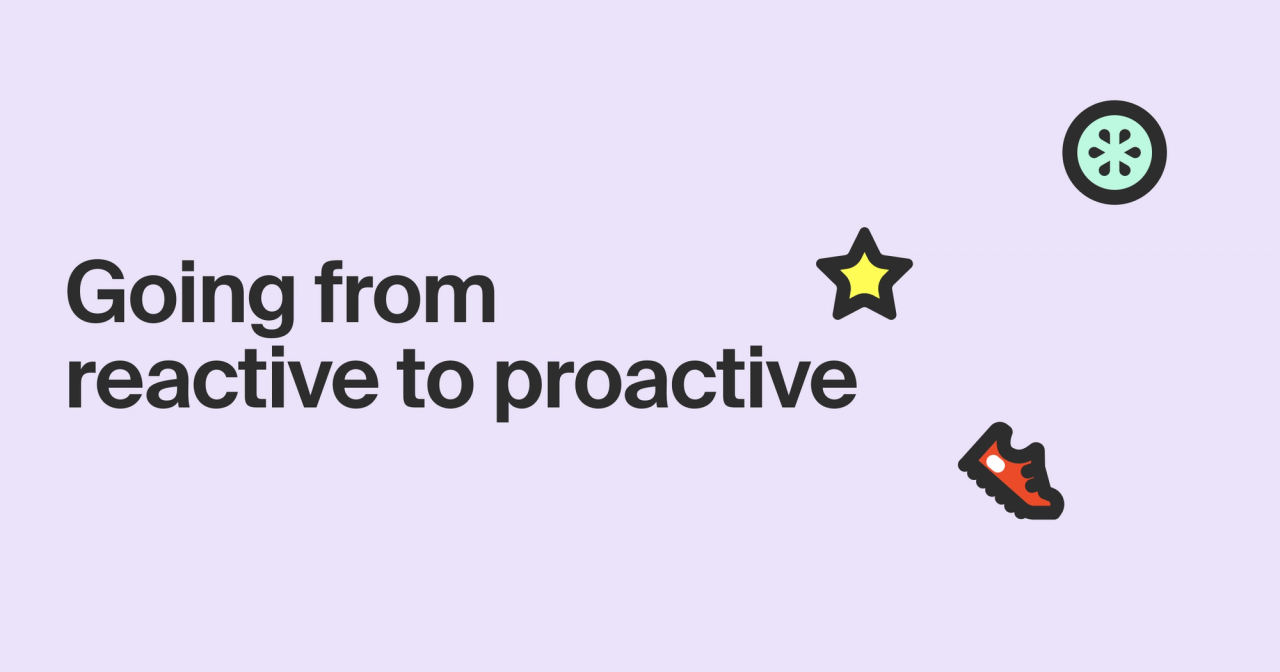Word-of-mouth marketing, faster sales cycles, long-term customer loyalty—these are just some of the benefits a vibrant community offers up developer-focused companies.
But if you’re buried under an ever-growing pile of tedious and time-consuming tasks, it’s hard to focus on what makes an impact.
Learn how dev-first companies:
- Save time on building and managing communities
- Recognize and rally around high-value opportunities
- Optimize community engagement to hit business goals
You can’t steer the ship when you’re underwater
Managing a dev community means dealing with a lot of moving parts (and usually with limited resources).
There’s the day-to-day admin work: onboarding, answering questions, driving discussions, reporting on performance. It’s a timesuck. And that’s just for the communities you own on channels like Slack, Discord, and Discourse.
The communities you don’t own—the ones spread across GitHub, Stack Overflow, Reddit, and other digital touchpoints—are just as essential to fueling product awareness and adoption. And each channel comes with its own grind.
Maintaining a bird’s eye view of community activity across channels is tough. Following up on it—in real time and at scale—is even harder.
You’re either struggling to keep up with the activity you can see or struggling to get visibility into the activity you can’t. Likely it’s both. And that doesn’t leave a lot of time to focus on turning dev interest into dev action.
So instead of proactively surfacing opportunities to grow your community and drive business impact, you get stuck in a reactive loop.
‘Good enough’ isn’t good enough
Most go-to-market tools are built for traditional strategies. But marketing and selling to developers isn’t traditional.
So dev-focused companies cobble together a mixed bag of technologies to suit their needs. They try to connect the dots between native tools—repositories, messaging platforms, support forums—and point solutions, such as social listening tools. The result is limited insights, siloed workstreams, and an inability to prioritize what matters most.
To save time, spotlight opportunities, and keep your community happy, you have to consolidate your view of product users, automate manual processes, and move with speed:
| Track the entire user journey | Spot the signal from the noise | Take action and automate |
|---|---|---|
Connect all your critical user touchpoints in a single location. | Identify and prioritize the people behind conversations and actions. | Simplify and scale how teams stay alerted to and follow up on activities. |
Our research showed that when dev-focused companies have the right tools, they can:
- Save 100-plus hours on manual data reporting and analysis.
- Improve response rates by 25%.
- Close deals 20% faster.
Go from reactive to proactive with Common Room
Common Room helps you centralize all community activity in one place, zero in on the most relevant people and activities, and take action on them in real time. That way dev-focused companies can:
- Track community activity across multiple touchpoints and enrich data to resolve member identities
- Simplify and scale community analysis and reporting to uncover valuable insights
- Cut down on day-to-day tasks to spend more time on high-impact work
- Stay alerted to business-critical conversations and actions in order to respond quickly
- Prioritize and follow up on community activity that supports key business goals
The result is less manual work, higher member satisfaction, and more opportunities to drive better business outcomes.
Here’s how dev-first companies make it a reality:
Consolidate the developer ecosystem
First you connect all relevant data sources—digital, product, and customer—to Common Room. Data is automatically unified and enriched to resolve customer identities and provide visibility into cross-channel activities.

This gives you a single source of truth for your entire developer ecosystem across owned and unowned channels. You can easily drill down into conversations and actions related to specific community members and organizations.
🎤 “Because our community, the dbt Community, lives on so many different platforms, Common Room is kind of that foundational platform where we funnel all information about things that are happening.”
—Anna Filippova, Senior Director of Community and Data at dbt Labs
Discover community insights
Next you can dive into the insights you care about with comprehensive reporting.
AI-powered natural language processing detects meaningful concepts in community conversations and uncovers the sentiment associated with them so you can understand what has people talking and how they feel about it.
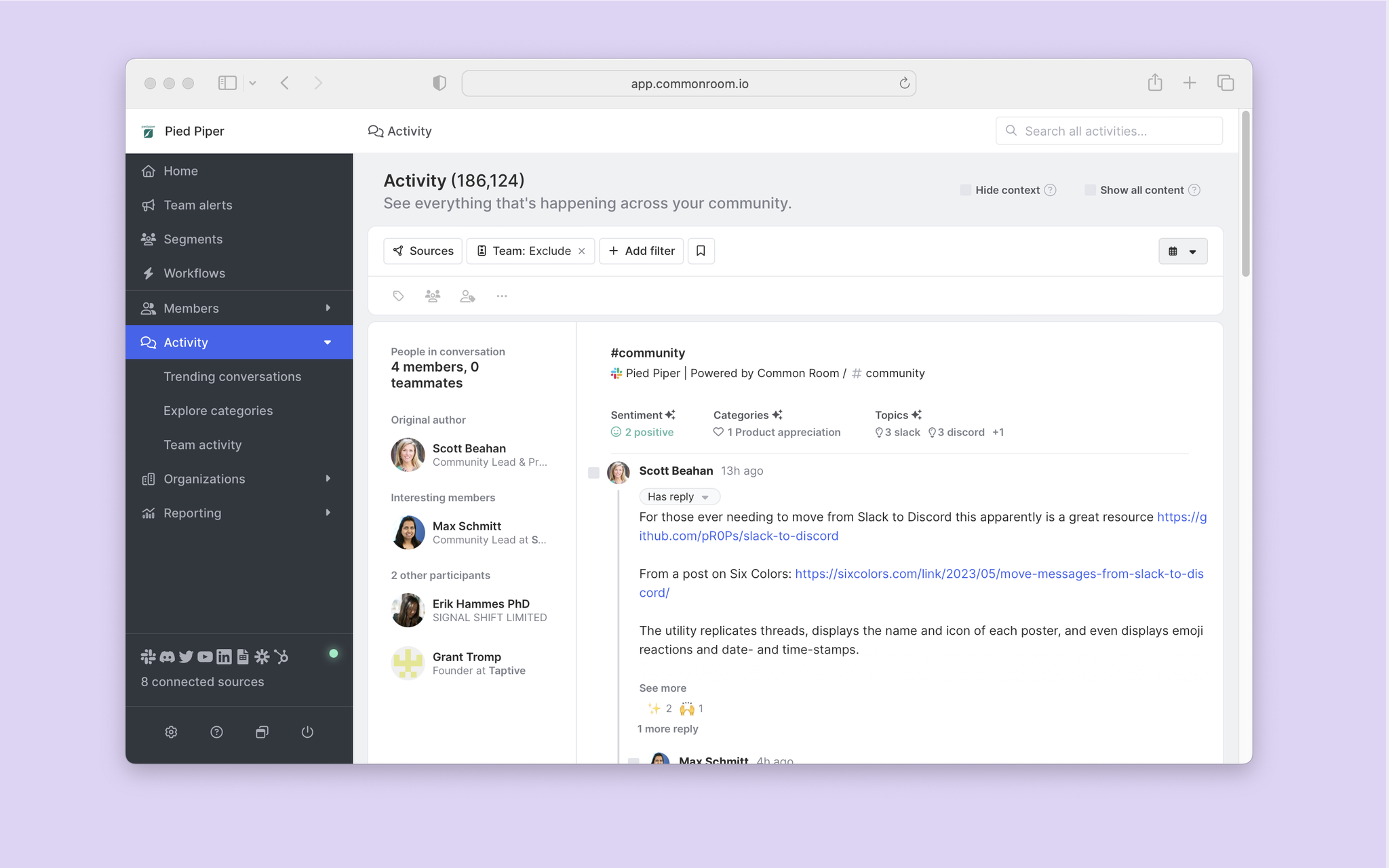
This helps you synthesize and measure community activity in real time as it relates to new feature releases, hosted events, and other crucial business initiatives.
🎤 "Common Room does the hard work of parsing through and serving up serious or trending topics so we can quickly understand what the community needs."
—Jared Jones, Head of Ecosystem at Moov
Activities can be filtered by category so you can quickly find and follow up on product complaints, praise, questions, and more.
This helps you easily surface activity that requires a response and quickly take action (not to mention inform product development).
You can then filter by key attributes—job title, location, industry, and more—to prioritize individuals and organizations that fit your ideal customer profile.
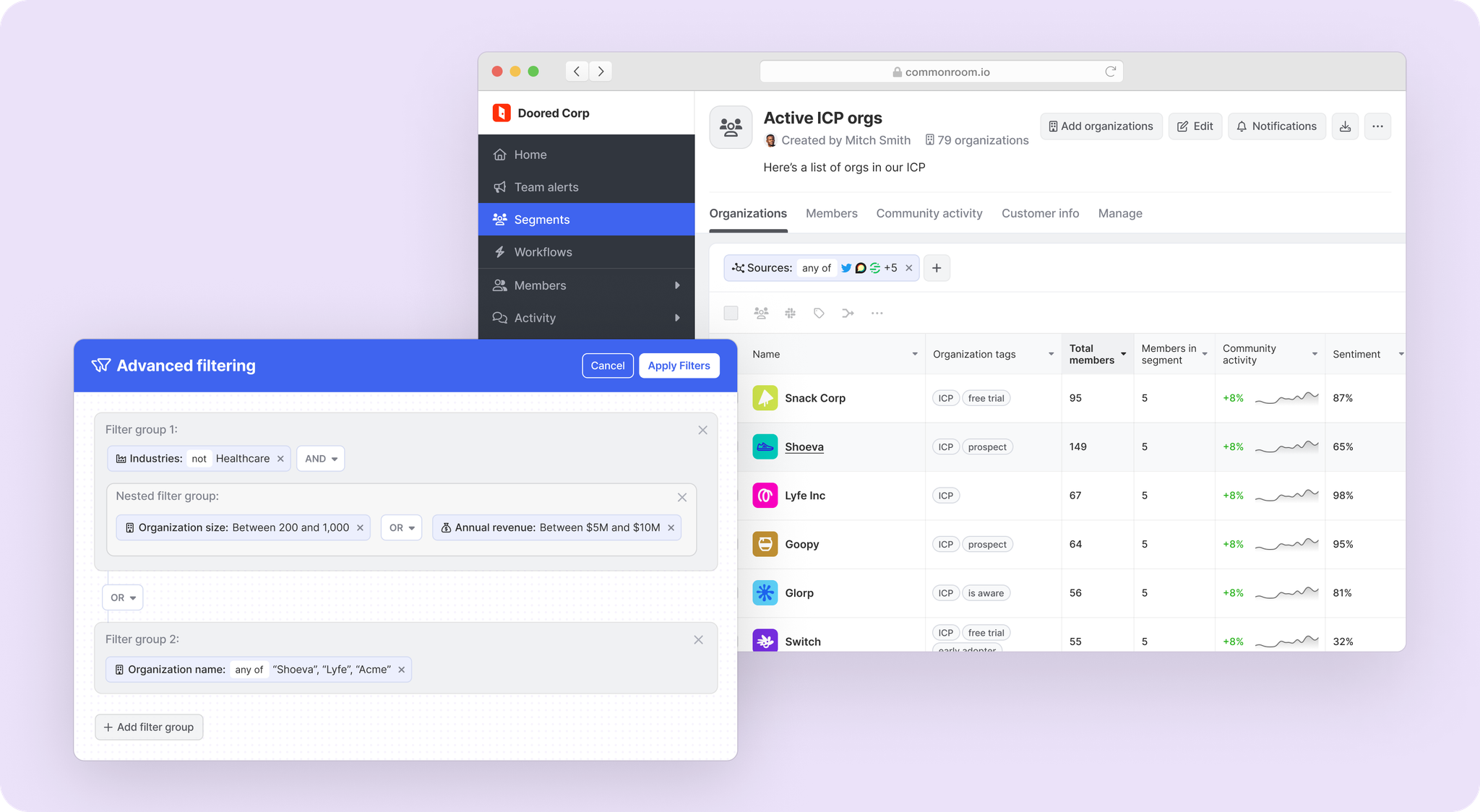
This helps you uncover essential business context and separate the most important activity from the rest of the chatter.
🎤 “Common Room helps us focus on the organizations that get the most value from our product. We know which attributes make someone a great fit for Replit. Before Common Room, I wasn't able to find and build relationships with these people."
—Lena Vu Sawyer, Head of Community at Replit
Once you know who to engage first, you can tag them to easily track and report on influencers, economic buyers, and other key personas.
This helps you focus on the people and companies that have the most impact on your community or are a great match for sales conversations.
Meanwhile, impact points help you understand which community members are driving the most impact based on their behaviors, from posts on Discord to repo stars on GitHub.

This helps you see who has the most sway over your community and identify possible brand advocates and product champions.
🎤 "Common Room is the command center for the Temporal community. We love being able to get an overview of user activity at an individual and an organizational level.”
—Shawn Wang, Head of Developer Experience at Temporal
Simplify engagement strategy
After you know what to take action on, you can add individuals and organizations to dedicated segments.

This helps you track, report on, and engage VIP community members one by one or all at once.
🎤 "Common Room gives us the ability to better see and segment our community to ensure we meet members where they are, support them with the specific resources they need, and elevate the voices of the experts who want to share their knowledge.”
—Dave Nielsen, Senior Director of Community Relations at Harness
You can also make sure you never miss out on an opportunity with real-time alerts.
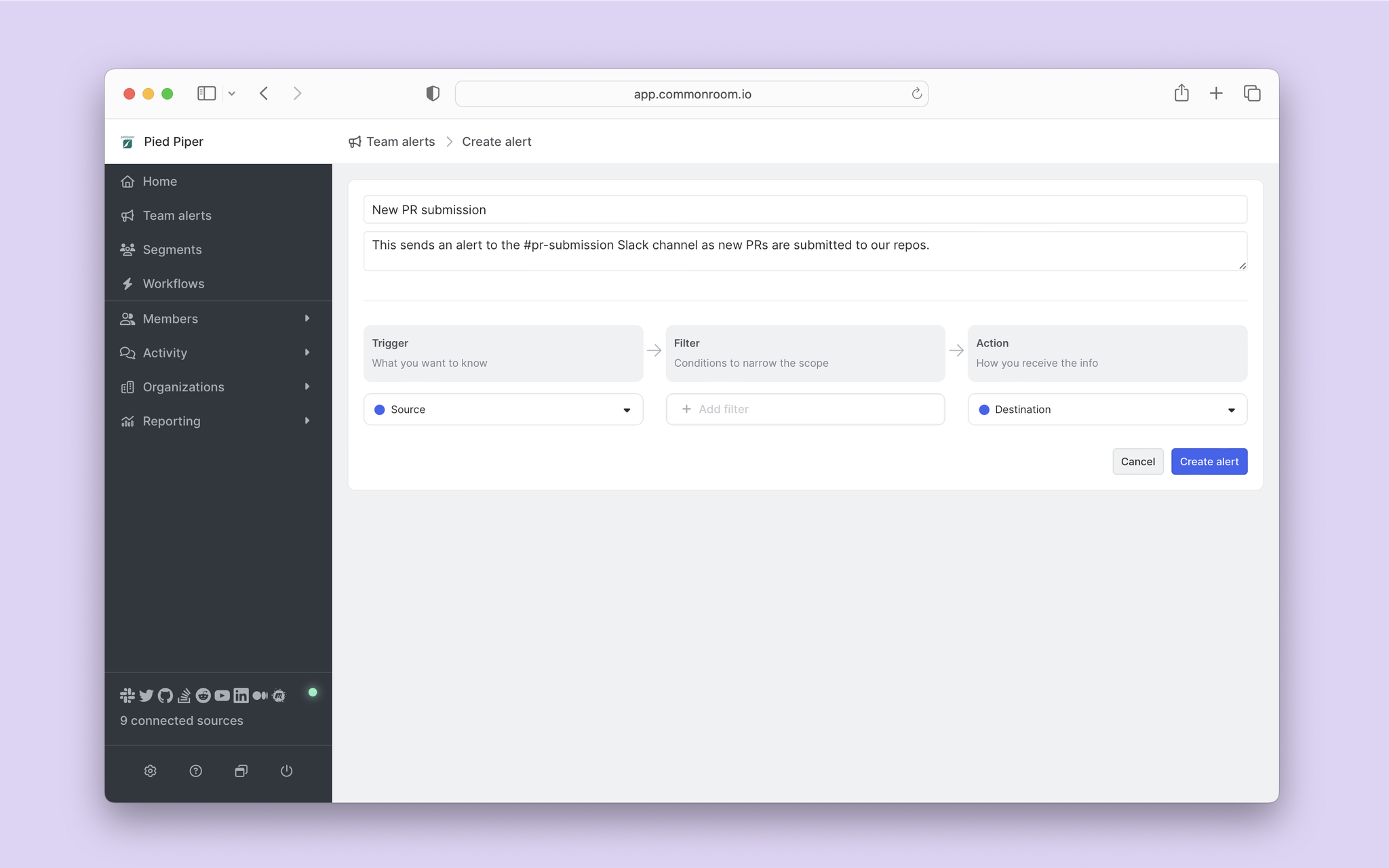
This helps you cut down on response time and make sure you’re always up to date on high-priority community activity.
Then you can follow up swiftly and at scale with automated workflows for everything from community onboarding to member tagging.
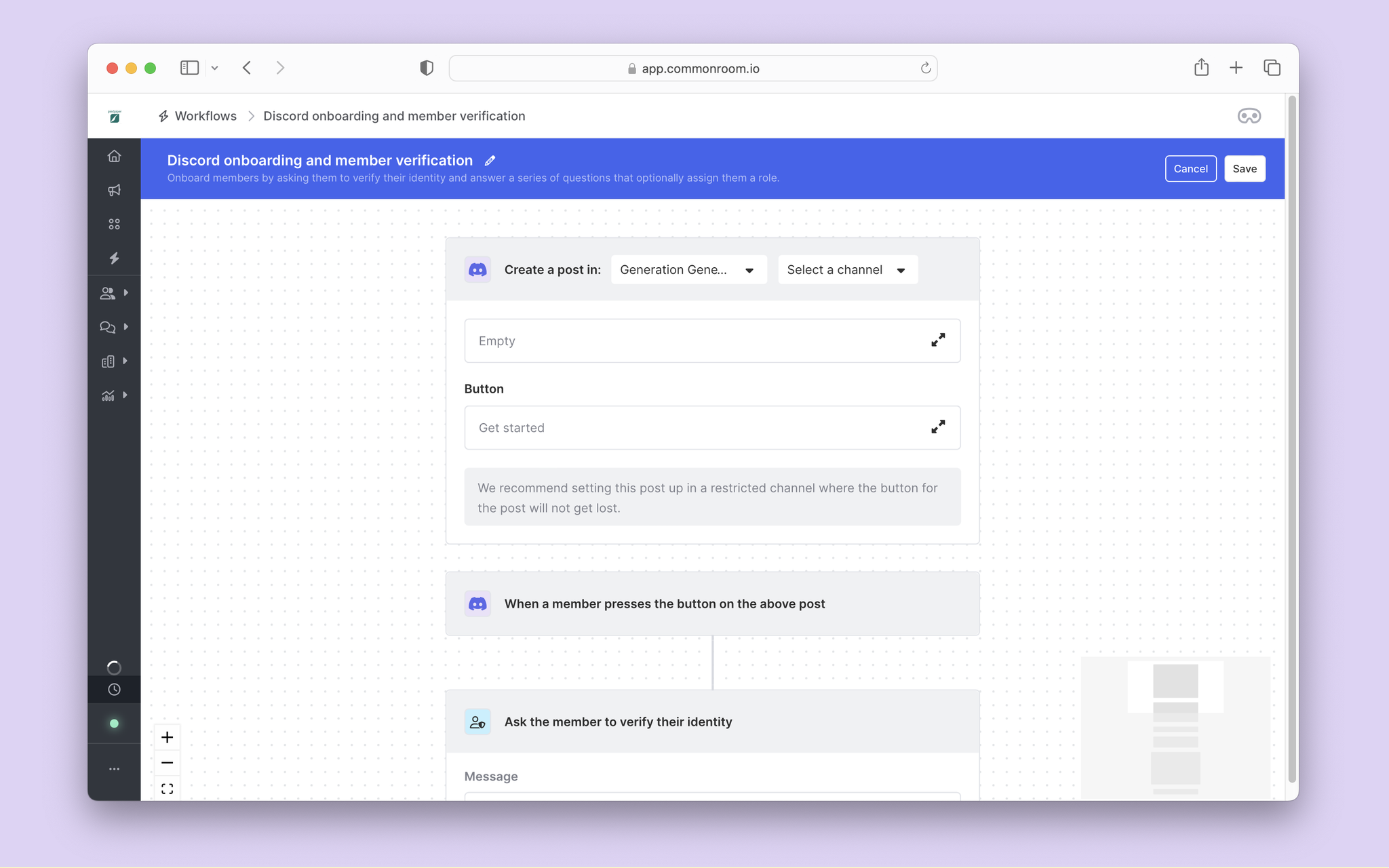
This helps you scalably welcome, verify, survey, and message your community members to keep them happy and engaged over time.
🎤 "I'm very data-driven, and when it comes to community intelligence and workflows, I've never seen anyone do it as comprehensively or as elegantly as Common Room. Nothing else in the market is close."
—Jared Jones, Head of Ecosystem at Moov
To maximize the value and performance of your community, you have to understand what moves the needle most and take action on it—quickly and at scale.
Dev-first companies use Common Room to make sure they’re focusing on the right things at the right time.
Boost community efficiency and impact with Common Room
Ready to see how Common Room helps you save time, do more with less, and improve community ROI?
